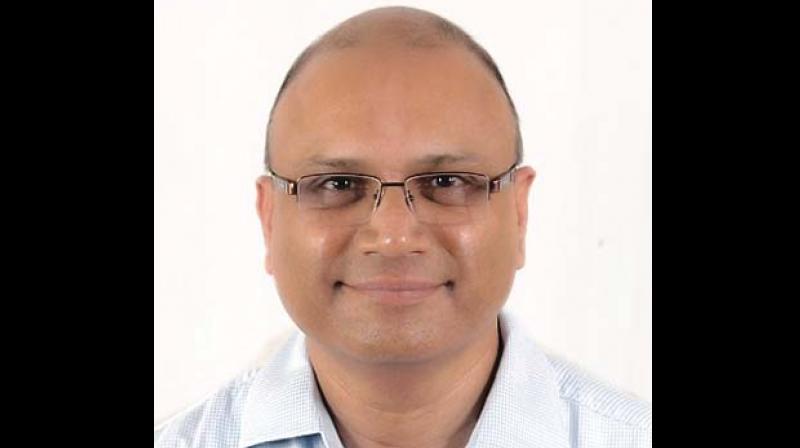Q&A: Monitoring & enforcement of Net neutrality a huge task for regulators'
Dr Sridhar, an authority on Net neutrality, spoke to Mini Tejaswi on the recent controversy around the topic.

Dr. V. Sridhar, a professor at the Centre for IT and Public Policy at International Institute of Information Technology, Bangalore, has authored two books on telecom. He has been a member of Government of India committees on spectrum allocation and pricing. Dr Sridhar, an authority on Net neutrality, spoke to Mini Tejaswi on the recent controversy around the topic. Excerpts:
What are the key issues involved in the Net neutrality (NN) debate?
In its simplest form, Net neutrality means that the Internet Service Provider (ISP) has to treat all data bits in the same manner, irrespective of their source, destination and application that generated it. There should not be any discrimination of such data bits in terms of price or priority. While the opponent camp includes telcos and ISPs, the proponents are the Content Providers (CPs). While the opponents say that strict enforcement of NN reduces their incentives to improve the underlying telecom and Internet infrastructure due to limited monetising opportunities, the proponents indicate that without NN, the small CPs will not be able to compete against larger ones thus killing innovation and business prospects of small entrepreneurs.
How will Net neutrality impact netizens and enterprises in India?
Net neutrality will provide a level-playing field for smaller as well as larger CPs and hence will provide an opportunity for the Indian start-ups in the Internet content and application space to compete with global giants such as Google and Facebook. For netizens, it can have mixed results. For example, programmes such as Free Basics of Facebook could possibly provide netizens free access to the content and applications.However, it will not provide them access to Internet in its entirety.
TRAI has recently spoken about forming a regulatory body to monitor and deal with any violation of Net neutrality. What should be the broader objective of such a body?
Though TRAI has come with detailed recommendations on NN recently, monitoring and enforcement are big challenges. We need to have large amount of granular data on access speed, pricing plans, across both access and backhaul networks, plus a detailed analysis of the same before any violation of NN is detected.
In 2015, the Federal Communications Commission (FCC) ruled in favour of Net neutrality in the US but the new regime has a change of mind and plans to repeal the existing rules. What do you think is the reason for this change and what could be the impact?
As mentioned earlier, monitoring and enforcement of NN is a big challenge for regulators. The argument of FCC Chairman Ajit Pai is that NN amounts to micromanaging the operations and business models of the ISPs. It also curtails the ISPs in terms of monetisation of their assets such as radio spectrum and infrastructure and hence provides a barrier for further investment. This could potentially impact quality of service delivery. Under the Obama administration, the Title II provisions of the Communications Act of 1934 reclassifies Internet service offerings as telecommunication service (as opposed to information service as stated earlier) and empower the regulatory authority to scrutinise the conduct of broadband service providers and take penal actions if violations are found. Mr Pai is also against this provision as he says it will lead to over-regulation of the ISPs.
Are service providers in India following Net neutrality guidelines in true sense?
After TRAI notified “Prohib-ition of discriminatory tariffs for data services regulation” in February 2016 principally against “zero rating” (free data) of Free Basics programme offered by Facebook, the ISPs have been cautious about discriminatory pricing. While it is easy to notice any form of discriminatory pricing, prioritisation is difficult to observe. That is whether ISPs have been accelerating one application/content (e.g. Hike Messa-ging) compared to others (e.g. WhatsApp) is difficult to monitor and regulate.
TRAI in its recent recommendations has focussed only on ISPs. I and Prof. Rohit Prasad at Management Development Institute, Gurgaon, have always argued and submitted our response to TRAI consultation process that NN advocates must examine its applicability not only to ISPs but also to CPs and Content Delivery Networks (CDNs) who are the intermediaries between ISPs and CPs. The recent TRAI recommendation clearly has absolved CDNs and not even mentioned CPs under NN regulation. Hence, any vertical integration between CPs, CDNs and ISPs might escape the scrutiny of the NN regulation.
Is Internet functioning with-out prejudice or preferential treatment to any particular sites or services or do you see compromises happening?
We need to understand that ISPs are just one part of the Net neutrality puzzle. While the focus has been traditionally on ISPs’ discriminatory practices, no one talks about Google’s sponsored search or Facebook’s advertisements which are also one form of discrimination. While it is difficult to detect and enforce such discrimination, we need to be conscious of the fact that some of the CPs with valuations which are multiple times that of the ISPs could discriminate and distort the equity of the Internet. Hence, apart from the ISPs, Content Providers also need to be brought under close watch!

